Mastering Garden Maintenance: The Role of Landscape Gardeners
Introduction to Landscape Gardeners in Garden Maintenance
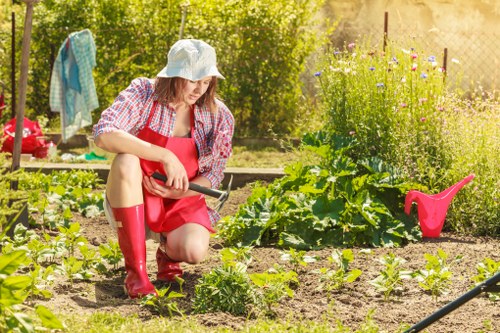
Landscape gardeners are the unsung heroes behind gorgeous, well-maintained gardens. Their expertise transforms outdoor spaces into beautiful, sustainable sanctuaries that are not only pleasing to the eye but also practical for everyday life. Garden maintenance is a broad field that encompasses design, planting, regular upkeep, and innovative sustainability approaches. Skilled professionals use a mix of traditional horticultural practices and modern techniques to ensure that every garden thrives throughout the year.
In today’s fast-paced world, maintaining a garden can seem like an overwhelming task. However, landscape gardeners bring a level of artistry and technical skill that makes garden maintenance both efficient and effective. They combine aesthetic insight with practical expertise, addressing both the visual appeal and the health of plants. Their work results in gardens that are not only visually impressive but also resilient to the challenges of weather and seasonal change.
From designing bespoke landscapes that complement architecture to implementing strategic irrigation and fertilization systems, landscape gardeners are an integral part of garden maintenance services. Their attention to detail and commitment to sustainable practices help enhance biodiversity and conserve natural resources. This article will explore the multifaceted role of these experts, offering insights and practical advice on how professional garden maintenance can elevate your outdoor space.
The Impact of Expert Landscape Gardeners on Garden Health
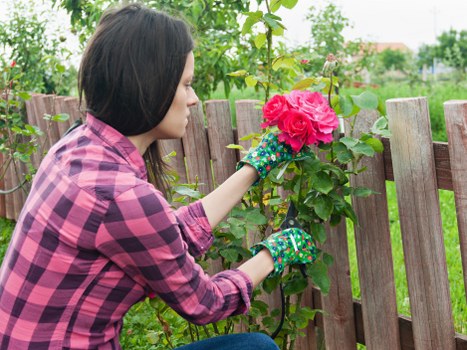
The influence of landscape gardeners extends far beyond superficial beautification. Their deep understanding of soil health, plant biology, and environmental conditions enables them to create gardens that are robust and adaptive. By using organic methods and environmentally friendly products, these professionals ensure that the garden ecosystem remains balanced and pest-resistant. Maintaining garden health is not just about aesthetics; it is about creating a thriving natural habitat.
Landscape gardeners often adopt a holistic approach to garden care. They start by assessing the unique conditions of each garden, including sunlight exposure, soil composition, and moisture levels, then develop a tailored plan that integrates both aesthetic design and practical maintenance. This careful planning results in healthier plants, reduces waste of resources, and minimizes the need for chemical interventions. Eco-friendly practices such as composting and sustainable water management are central to this approach.
Moreover, professional garden maintenance by landscape gardeners often includes routine inspections and seasonal adjustments. Their expertise ensures that the garden evolves with changing conditions, thereby prolonging its vibrancy and functionality. Regular upkeep through pruning, mulching, and mechanical care helps to uncover hidden issues before they escalate, contributing to a garden that not only looks splendid but also sustains its ecological balance. Contact us today to learn how expert garden care can transform your outdoor space!
Essential Techniques and Tools for Garden Maintenance
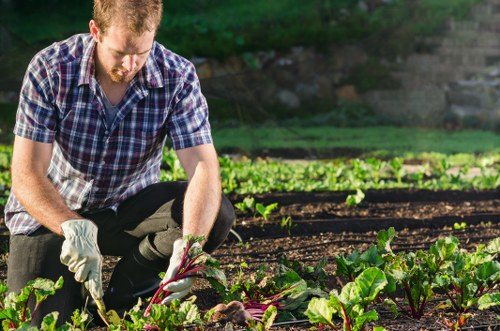
Central to effective garden maintenance are the various techniques and tools that landscape gardeners use. Whether it is the right choice of pruning shears or the selection of organic fertilizers, every decision contributes to the long-term health and beauty of a garden. These experts carefully select the appropriate equipment and products that will provide lasting benefits with minimal environmental impact.
Landscape gardening involves a blend of traditional methods and innovative technology. To manage large areas effectively, professionals often rely on automated irrigation systems, eco-friendly pest control measures, and mechanical mowers that offer precision cuts without harming delicate flora. Efficient tools reduce manual labor and help achieve consistent results in garden maintenance. A list of some essential tools includes:
- High-quality pruning shears
- Eco-friendly fertilizers
- Automated irrigation systems
- Soil testers and moisture meters
- Specialized mowers and trimmers
Understanding the purpose and proper use of these tools is fundamental to achieving a garden that is both visually appealing and ecologically sound. Attention to detail in tool selection and application can significantly affect the success of garden maintenance. Professionals back up their choice of tools with extensive training and field experience, ensuring that every cut, every watering, and every planting contributes to a long-lasting, healthy landscape. Book your service now and experience the benefits of professional landscaping techniques!
Sustainable Practices and Innovative Approaches in Landscaping
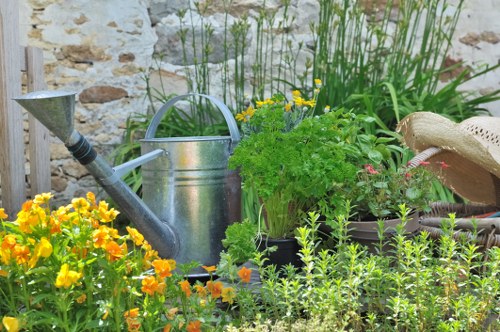
Among the many facets of garden maintenance, sustainability has emerged as a core principle in modern landscape gardening. Skilled landscapers now emphasize practices that conserve water, protect local wildlife, and reduce the use of harmful chemicals. These green practices not only result in healthier gardens but also contribute to a more sustainable environment overall. By integrating renewable resources and energy-efficient methods, landscape gardeners are setting new benchmarks in garden care.
Landscape gardeners are pioneers in adopting sustainable technologies such as rainwater harvesting systems, solar-powered lighting, and organic pest management. These innovations help reduce the environmental footprint of garden maintenance while ensuring that gardens remain a source of natural beauty. Innovative approaches such as vertical gardening and xeriscaping are gaining popularity, especially in regions prone to water scarcity. Every element of a sustainable garden is carefully planned to ensure maximal benefits with minimal environmental costs.
The adoption of sustainable practices also involves educating homeowners and local communities about the importance of environmental stewardship. By using eco-friendly materials and adopting low-impact techniques, landscape gardeners inspire others to embrace a more responsible way of living. They provide guidance on selecting native plants, planning seasonal rotations, and even reusing garden waste for composting. This commitment to sustainability makes professional garden maintenance a crucial investment in the future of our ecosystems. Contact us today to embrace a green and sustainable outdoor space!
Integrating Aesthetics with Practical Garden Solutions
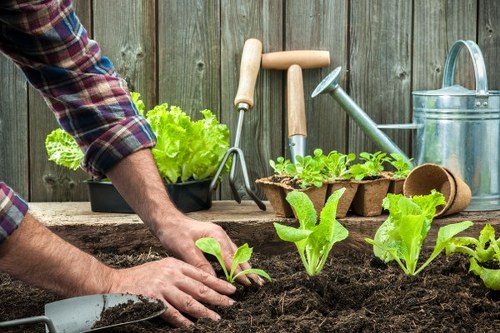
One of the most striking aspects of landscape gardening is the ability to balance visual appeal with functional practicality. The relationship between aesthetics and utility is at the heart of garden maintenance. Thoughtfully designed gardens not only captivate the eye but also serve the needs of outdoor living by offering spaces for relaxation, entertainment, and even productive horticulture.
Design principles such as symmetry, balance, and contrast are often employed to create an environment where every element plays a role in the overall harmony of the garden. Landscape gardeners use creative design to integrate water features, seating areas, and vegetable patches into the layout, ensuring that both beauty and function are prioritized. Stylish yet practical design can transform a simple garden into a versatile outdoor retreat that caters to various activities.
The integration of aesthetics and practicality is further enhanced by the expert use of color palettes and material contrasts. Bold accents such as patterned pavers or vibrant flowering borders can be balanced with natural elements like stone walls and wooden structures. These thoughtful details contribute to a garden that is not only a feast for the eyes but also a functional space for daily activities. Book your service now to experience a garden that combines timeless beauty with modern practicality!
Seasonal Maintenance and Long-Term Garden Planning
Effective garden maintenance is a year-round commitment that demands careful seasonal planning. Landscape gardeners develop strategies that address the unique challenges each season brings, from the frosts of winter to the heat of summer. This strategic approach ensures that the garden continues to flourish regardless of changing weather conditions. Seasonal adaptation is a key component of successful landscape maintenance.
In the spring, gardeners focus on revitalization, planting new species, and rejuvenating soil with organic compost. Summer calls for a balancing act between hydration and sun protection, while autumn is the ideal time for pruning, cleanup, and preparing the garden for the coming cold seasons. Long-term planning often includes forecasting the growth cycles of different plant varieties, ensuring that the garden’s rhythm is consistent and sustainable throughout the year.
Long-term garden planning involves setting goals and scheduling regular check-ups to monitor the overall health of the landscape. Gardeners create detailed calendars highlighting key maintenance tasks such as fertilizing, mulching, and pest control. Precision in planning ensures that no aspect of garden care is overlooked, reducing the need for emergency interventions and preserving the aesthetic charm of the outdoor space. By planning ahead, based on both seasonal trends and personal preferences, landscape gardeners guarantee that your garden remains in peak condition all year long.
The Future of Landscape Gardening and Garden Maintenance
As environmental awareness grows, the world of landscape gardening is evolving to meet new expectations regarding sustainability, technology, and design. Today's garden maintenance is rapidly embracing digital tools for precise watering, soil analysis, and even drone-assisted mapping of large properties. These technological innovations are reshaping how professional garden maintenance is approached, leading to more efficient and eco-conscious practices. Future-oriented techniques ensure that garden care remains resilient and responsive to evolving challenges.
Emerging trends in garden maintenance suggest a move towards hyper-personalized garden designs that take into account local climate variances, usage patterns, and even micro-ecosystems. Landscape gardeners are increasingly collaborating with architects, environmentalists, and urban planners to create designs that are integrated with community needs. Innovative garden solutions now play a central role in urban development, transforming mundane outdoor spaces into vibrant green hubs that boost both property value and quality of life.
The dialogue between tradition and innovation is at the core of modern landscape gardening. Expert gardeners continually refine their methods to harness the best of both worlds—ensuring that time-honored horticultural wisdom is seamlessly blended with the latest technological advances. This forward-thinking approach not only preserves the lush aesthetics of garden spaces but also promotes environmental resilience. With technology paving the way, the future of landscape gardening promises more sustainable, smarter, and more beautiful outdoor experiences. Contact us today to be a part of this exciting revolution in garden maintenance!
Additional Insights on Advanced Garden Strategies
Beyond the routine tasks, high-end garden maintenance involves a proactive approach to landscape planning. Expert gardeners often implement advanced strategies, such as biodiversity zones, water re-cycling systems, and seasonal micro-climates within the overall garden design. Using a mix of modern science and creative intuition, these strategies ensure that every square foot of your garden is optimized for both beauty and functionality.
The implementation of such advanced systems requires a deep understanding of local flora, climate variations, and soil dynamics. Landscape professionals invest in continuous learning and technology upgrades to stay ahead of emerging trends. For instance, precision horticulture now uses smartphone applications and sensor systems that help monitor soil moisture and plant health in real time, revolutionizing traditional garden maintenance practices with data-driven insights.
As part of an integrated maintenance plan, these advanced strategies offer homeowners long-term savings and improved garden performance. Seamless integration of technology with natural elements creates an environment where every plant, flower, and shrub can thrive. By staying informed about the latest innovations and adapting them to the unique demands of each garden, landscape gardeners ensure that maintenance practices not only meet but exceed modern expectations.
Expert Tips for Home Gardeners
While professional landscape gardeners bring a wealth of expertise to garden maintenance, many of their insights are invaluable for the passionate home gardener as well. One key tip is to always balance aesthetics with functionality. Whether you are creating a cozy corner or an expansive landscape, focus on selecting plants that suit your local climate and soil type. This careful selection minimizes upkeep and maximizes natural beauty.
Another useful technique is to use seasonal planting strategies. By rotating your plants throughout the year, you can ensure that your garden remains vibrant in every season. It’s also important to incorporate features such as compost bins and rainwater collection systems, which boost soil fertility while reducing your environmental impact. Remember, every small step contributes to a healthier garden environment.
Finally, invest in quality tools and make sure you know how to use them properly. Whether it’s a set of durable pruning shears or a technologically advanced irrigation system, the right tools make a considerable difference in your garden maintenance routine. Book your service now or try these expert tips in your own garden and see the transformation in action. Embrace the journey of creating a garden that is as sustainable as it is beautiful.

